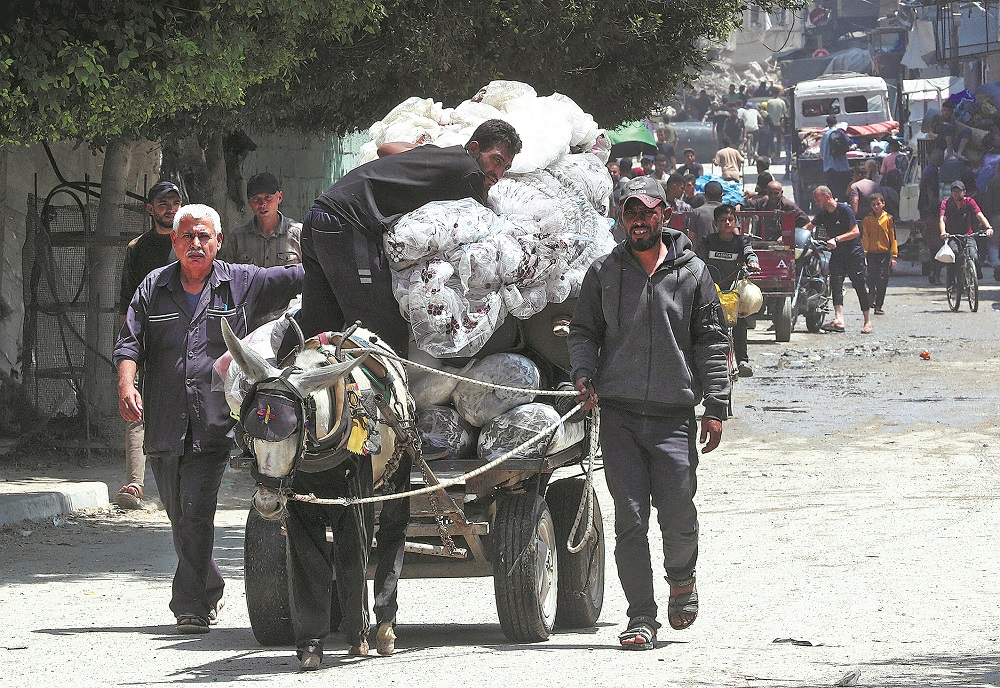Israel deports aid flotilla activists


Israel began deporting detained Gaza aid flotilla activists on Tuesday amid growing international objection to its extensive sea and land blockade that has been grinding Palestinians into deeper famine and bleeding.
The Madleen, which set sail from Catania in Italy on June 1 with 12 activists on board, was stopped by the Israeli military on Monday in international waters. Israeli forces took the boat and those aboard to the port of Ashdod.
The Freedom Flotilla Coalition, which organized the charity boat's efforts to deliver aid to Gaza by sea, bypassing the Israeli blockade, said Israel's military had "attacked" and "unlawfully boarded" the Madleen and detained the activists.
Among them was Swedish campaigner Greta Thunberg, who was put on a plane to Sweden via France, the Israeli Foreign Ministry said.
French President Emmanuel Macron had requested that the six French nationals aboard the boat "be allowed to return to France as soon as possible", a presidential official said.
Spain's Foreign Ministry summoned Dan Poraz, charge d'affaires at the Israeli embassy in Madrid, on Monday.
Global campaigning network Greenpeace called on the international community to urgently uphold international law and ensure the immediate release of the Madleen crew.
The People's Coalition on Food Sovereignty on Tuesday expressed its utmost concern and condemnation of the capture of the Madleen and its crew.
The Organisation of Islamic Cooperation expressed its strong condemnation of the "blatant assault on the ship" and what it called the "kidnapping of the political and humanitarian figures" on board the ship.
'Death traps'
Meanwhile, 20 people were killed and more than 124 injured while waiting for aid south of Gaza City on Tuesday, Al Jazeera reported.
Adi Dabour, an official at the Palestinian Medical Relief Society in Gaza, was quoted by the network as saying that aid centers have turned into "death traps".
The latest developments are a sign of desperate frustration, where civilians have started taking matters into their own hands.
Arhama Siddiqa, a research fellow at the Institute of Strategic Studies Islamabad in Pakistan, told China Daily that Israel's seizure of the Madleen and detention of activists were "not a matter of border control", but the "violent policing of global solidarity".
"The Madleen was intercepted in international waters, carrying aid, not arms, and hope, not hostility," Siddiqa said.
Gokhan Batu, an analyst on Israel studies at the Center for Middle Eastern Studies in Turkiye, said what the diverse group of international activists truly aimed to do was highlight the deepening humanitarian crisis in Gaza — "and in that, they succeeded".
Activists broadcast their message in real time, while Israel responded with its own digital campaign to portray the interception as lawful and restrained, he said.
Siddiqa agreed that people "have started to take matters into their own hands — not recklessly, but out of moral urgency".
With institutions either complicit or paralyzed, recent grassroots actions represent the rise of people-powered diplomacy — "a growing civilian defiance against the normalization of Israeli violence", she added.
In a similar move, a convoy of thousands of volunteers set out from Algeria on Monday, heading for Tunisia and onward to Gaza, aiming to break the siege.
The convoy includes human rights activists, doctors, journalists and members of youth organizations carrying vital supplies such as food, water and medical aid.
Agencies contributed to this story.

































